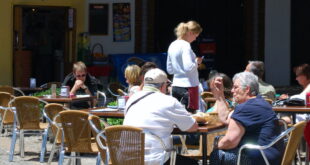The summer season is at its height, and Spain’s Directorate General for Traffic has activated the “August 1st Special Operation” to handle an estimated 6.88 million road journeys from Thursday, 31 July at 3pm until midnight on Sunday, 3 August.
This annual operation begins August, which is the busiest travel month of the year. An estimated 52,87 million journeys long and short distances are expected to be made on the Spanish road network during the entire month. DGT deployed all its human and technical resources across the country to ensure traffic safety and manage the huge volume.
This season has already had a heavy cost, with 111 reported fatalities on Spanish road in July alone. 36 of them were motorcyclists. DGT has called these statistics “alarming” and urged road users to exercise caution and adhere strictly to traffic laws. The DGT states that driving conditions in summer are very different than other times of year. They include increased traffic on secondary highways, longer nighttime trips, a congested coastline, and more cyclists and pedestrians.

Credit: DGT
The operation, which is aimed at ensuring everyone’s safety will be marked by a convergence of different travel patterns. This includes mass departures of urban centres towards coastal and tourist destinations; the return of people who have just finished their July holidays and the usual weekend traffic. The roads will also see an increasing number of Portuguese and Moroccan cars, the latter of which is heading south in the first phase for the 2025 Operation Crossing the Strait en route to the border crossings where ferries can reach Africa.
In Eastern Andalusia, the provinces of Almería, Granada, Jaén, and Málaga, approximately 650,800 long-distance trips are expected over the weekend. DGT’s Southeast Traffic Management Centre at Malaga Provincial Traffic Headquarters is responsible for coordinating the regional effort. It will be supported by DGT Air Unit which will deploy helicopters and drones to monitor traffic in real time during peak hours.
DGT’s nationwide operation employs a wide range of resources including Traffic Group agents, Guardia Civil staff, traffic management centre personnel, drones and helicopters for live surveillance and fixed and mobile cameras. Road maintenance crews, as well as cars that detect drivers who are smoking or using their mobile phones while driving. DGT measures include reversible and extra lanes with signage and cones, stopping roadworks, restricting heavy vehicle and hazardous goods transport at specific times during the day, on certain routes and banning sporting events and other activities which could increase traffic.

Credit: DGT
The DGT has identified the times when travel is most difficult during the operation. From 4pm to 11:00pm on Thursday, the 31st of July, heavy traffic will be expected as drivers depart major cities in order to travel primarily to beaches. From 3pm to midnight on Friday, August 1, traffic will remain congested, particularly along routes leading to coastal destinations. Saturday, Aug. 2, will be a busy morning from 9am-2pm. On Sunday, Aug. 3, there will be heavy traffic from 4pm-11pm on major routes to urban centers.
DGT provides drivers with essential driving advice and asks them to be cautious and preventive in order to ensure safe travel. The DGT advises drivers to plan their route, inspect their vehicle’s condition (especially tires, brakes and lights), avoid busy travel times and be well rested, especially in the summer heat. They advise that during the trip, drivers should maintain safe following, travel with full fuel tanks to prepare for delays and wear seatbelts in all seating positions.
 Costa News Spain Breaking News | English News in Spain.
Costa News Spain Breaking News | English News in Spain.





